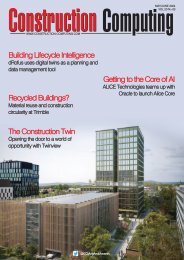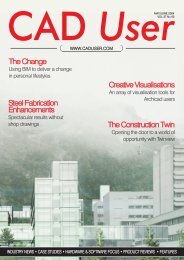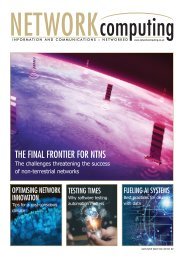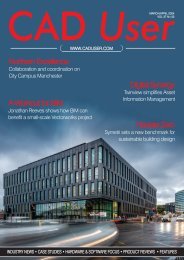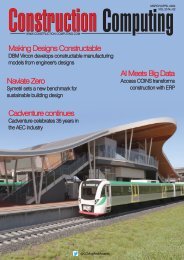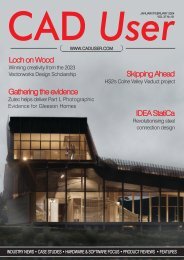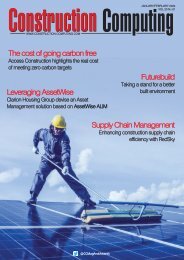Create successful ePaper yourself
Turn your PDF publications into a flip-book with our unique Google optimized e-Paper software.
ROUNDTABLE: <strong>2021</strong> PREDICTIONS Dm<br />
"CONTENT MANAGEMENT AND DATA MANAGEMENT HAVE BECOME<br />
COMMODITIES. THE VALUE THAT BUSINESSES WILL BE LOOKING FOR IN<br />
THEIR SYSTEMS IS TO BE ABLE TO STEP THROUGH THEIR ENTIRE BUSINESS<br />
PROCESS, REGARDLESS OF WHETHER INDIVIDUAL STEPS INVOLVE<br />
CONTENT OR DATA - AND TO DO SO IN AS FEW DIFFERENT<br />
SYSTEMS/USER INTERFACES AS POSSIBLE." - MAX KELLEHER, GENERIS<br />
become seamless - and this will be<br />
helped by commoditisation of this<br />
technology with initiatives like Project<br />
Cortex from Microsoft."<br />
AUTOMATION FOR THE PEOPLE<br />
Alongside AI, RPA was one of the topics<br />
we returned to again and again<br />
throughout 2020, so it was no surprise to<br />
see it feature in the thoughts of many of<br />
our panel. Amanda Holmes of Kodak<br />
Alaris said: "Intelligent capture in<br />
combination with RPA will be particularly<br />
powerful in areas such as finance, IT,<br />
operations and information governance<br />
that have large process volumes and<br />
amounts of unstructured information and<br />
content tied to critical processes. RPA<br />
technologies which can automate<br />
repeatable processes, uncover efficiencies<br />
and provide insights, will make the path<br />
to digital transformation faster and more<br />
cost-effective, enabling companies to take<br />
information capture to the next level, by<br />
making total automation and paper-free<br />
processes a business reality."<br />
Hyland's Tim Hood agrees: "Any<br />
organisation that isn't using RPA is missing<br />
out on serious automation quick wins.<br />
The pandemic gave companies added<br />
motivation to automate in general,<br />
especially around mundane tasks, the type<br />
that are in RPA's wheelhouse. Even those<br />
with an automation solution in place with<br />
traditional tools like workflow, will benefit<br />
from the 'automation extension' provided<br />
by RPA. A typical use case is integrating<br />
with an otherwise inaccessible application<br />
to copy and paste data from one system<br />
to another. The future of RPA will have<br />
self-learning bots with the integration of<br />
AI, especially machine learning. Systems<br />
and bots will learn from previous<br />
decisions to handle more and more rulesbased<br />
processes independently. "<br />
Liz Benson of Kofax expands on this<br />
theme: "RPA has caught on like wildfire,<br />
because it made automating routine,<br />
mundane tasks fast, easy and dare I say,<br />
fun. It made motivation-killing work like<br />
monotonous, cut-and-paste data entry a<br />
drudgery of the past. Where does RPA go<br />
from here? It's all about workflow." She<br />
goes on: "For savvy companies, <strong>2021</strong> is<br />
about harnessing their RPA automation<br />
expertise - and leveraging it with<br />
complementary technologies like process<br />
orchestration and document intelligence<br />
to automate their mission-critical<br />
business workflows."<br />
For some, the idea that certain<br />
technologies are on the verge of being<br />
seen as commoditised is not limited to<br />
emerging tech such as AI and RPA.<br />
Generis' Max Kelleher again: "Content<br />
Management and Data Management<br />
have become commodities. The value<br />
that businesses will be looking for in their<br />
systems is to be able to step through their<br />
entire business process, regardless of<br />
whether individual steps involve content<br />
or data - and to do so in as few different<br />
systems/user interfaces as possible:<br />
meaning a true enterprise workspace is<br />
the shape of the future, not as an empty<br />
phrase but really as a space to do all your<br />
work. The lines between content and<br />
data will become increasingly blurred: it<br />
will be essential to be able to extract data<br />
from documents, manipulate and<br />
manage the data through complete<br />
workflows and lifecycles, and then build<br />
documents from data."<br />
PFU's Mike Nelson sums up the general<br />
view of most of our experts: "Solely<br />
embracing digital technologies will not<br />
help businesses adapt to the new normal.<br />
A significant 86% of decision-makers say<br />
that managing the amount of<br />
information in their business is a<br />
challenge, and almost a quarter cited<br />
inaccurate decision making and lost<br />
documents as a result of 'information<br />
overload'. Therefore in <strong>2021</strong> we expect to<br />
see more organisations look to harness<br />
their collective organisational intelligence,<br />
breaking down silos and creating<br />
opportunities for the document<br />
management industry as a result."<br />
www.document-manager.com<br />
<strong>Jan</strong>uary/<strong>Feb</strong>ruary <strong>2021</strong><br />
@<strong>DM</strong>MagAndAwards<br />
9




